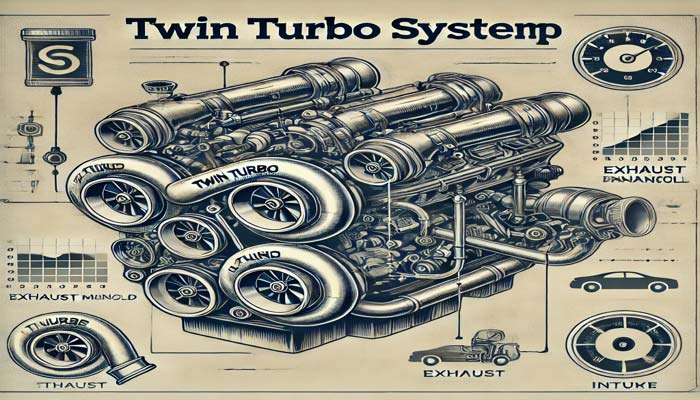
Introduction
In modern automotive engineering, boosting engine performance has become essential for both enthusiasts and manufacturers. One of the most effective ways to achieve this is through twin-turbo systems. These systems are increasingly popular due to their ability to significantly increase horsepower while improving fuel efficiency. In this article, we will explore how twin-turbo systems work, their benefits, and how they enhance overall engine performance.
What is a Twin-Turbo System?
A twin-turbo system consists of two turbochargers that work together to boost an engine’s performance. Unlike a single-turbo system, which uses one turbocharger to compress air into the engine, a twin-turbo system utilizes two smaller turbos. This configuration allows for quicker spool-up times and more efficient power delivery across a broader range of engine speeds.
In simple terms, the twin-turbo system helps the engine take in more air and fuel, creating more power and torque.
How Does a Twin-Turbo System Work?
A twin-turbo system works by using two turbochargers connected to the engine’s exhaust system. Each turbo is responsible for compressing air for a set of cylinders. Depending on the system design, they can operate in parallel (both turbos working at the same time) or sequentially (one turbo operates at low speeds, while the other takes over at higher speeds).
Parallel Twin-Turbo System
In a parallel system, one turbo is assigned to compress air for the left bank of cylinders, while the other handles the right bank. This setup reduces turbo lag and improves overall power output.
Sequential Twin-Turbo System
In a sequential system, one turbo works at lower engine speeds, while the second turbo kicks in as the engine speed increases. This allows for a smooth transition in power delivery and reduced turbo lag.
Benefits of Twin-Turbo Systems
A twin-turbo system provides several performance enhancements over a single-turbo system or naturally aspirated engines. The following are some key benefits:
Increased Power Output
The most obvious benefit of a twin-turbo system is its ability to increase engine power. By compressing more air into the engine, the twin-turbo system allows more fuel to burn, which generates more horsepower. This leads to a significant increase in engine performance, making the vehicle faster and more responsive.
Improved Fuel Efficiency
While turbo systems typically enhance power, a well-designed twin-turbo system can also improve fuel efficiency. By optimizing the use of air and fuel, the system makes the combustion process more efficient. This means more power is generated per unit of fuel, reducing fuel consumption, especially when driving at highway speeds.
Better Turbo Lag Control
Turbo lag is a common issue with single-turbo systems, where there is a noticeable delay between pressing the accelerator and the turbo providing power. Twin-turbo systems are designed to minimize this lag. In sequential setups, the smaller turbo operates at lower speeds, ensuring that power is delivered quickly. The larger turbo kicks in at higher speeds, making sure the vehicle has optimal power when needed.
Twin-Turbo Systems vs. Single-Turbo Systems
While both twin-turbo systems and single-turbo systems increase engine performance, they operate differently and offer different advantages.
- Single-Turbo Systems: Typically cheaper and simpler, but may suffer from longer turbo lag.
- Twin-Turbo Systems: More complex, but offer quicker response times, higher power output, and better overall efficiency.
Many high-performance vehicles, like sports cars and luxury sedans, prefer twin-turbo systems because they offer a better balance of power, responsiveness, and efficiency.
Challenges of Twin-Turbo Systems
Although twin-turbo systems provide many benefits, they are not without challenges. The complexity of installing two turbos can lead to higher costs, both in terms of manufacturing and maintenance. Additionally, the increased power and pressure can put extra strain on the engine, potentially reducing its longevity.
Maintaining proper cooling is crucial to prevent overheating, and tuning the system for optimal performance requires expertise.
Conclusion
In conclusion, twin-turbo systems are a powerful solution for enhancing engine performance. They offer improved power output, fuel efficiency, and reduced turbo lag, making them ideal for both sports cars and high-performance vehicles. However, it is important to consider the complexity and maintenance costs that come with these systems. As technology advances, we can expect twin-turbo systems to become even more efficient and accessible in a wider range of vehicles.
Frequently Asked Questions (FAQs)
1. What is the main advantage of a twin-turbo system over a single-turbo system?
Answer: The main advantage is that a twin-turbo system offers quicker spool-up times, better power delivery, and improved fuel efficiency compared to a single-turbo system.
2. Are twin-turbo systems more fuel-efficient?
Answer: Yes, twin-turbo systems can improve fuel efficiency by optimizing the air-fuel mixture and reducing the overall workload on the engine.
3. Do twin-turbo systems create more turbo lag?
Answer: No, one of the benefits of twin-turbo systems is their ability to minimize turbo lag by using multiple smaller turbos that work at different engine speeds.
4. Can I upgrade my car to a twin-turbo system?
Answer: It is possible to upgrade to a twin-turbo system, but it requires significant modifications to your engine and may be expensive. It’s recommended to consult with a professional before making such upgrades.
5. What is the cost difference between twin-turbo and single-turbo systems?
Answer: Twin-turbo systems are generally more expensive due to their complexity and additional components. They may also increase maintenance costs in the long term.
If Like This Article Visit Our Website. Collect From Wekiapedia